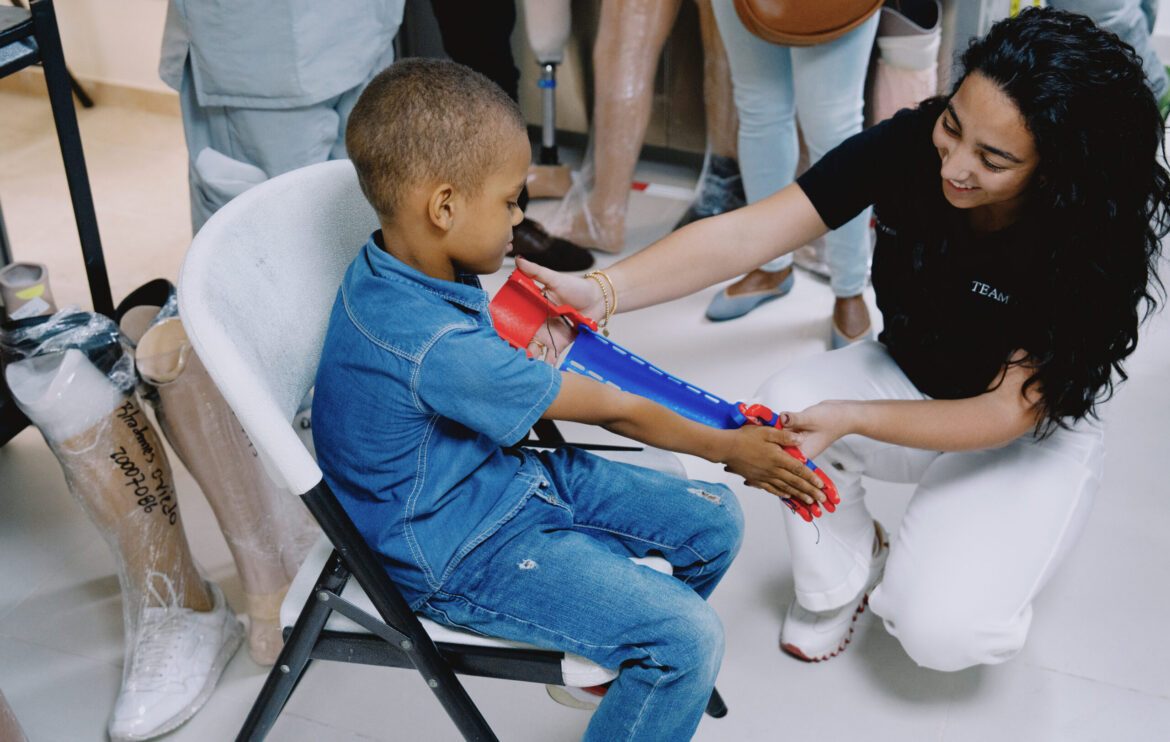USING INNOVATION TO CHANGE LIVES
A high school robotics team in the Dominican Republic has linked technology with social impact. Team captain Maura Osorio Rojas, Dr. Brian Kelly, Head of School and Dr. Kulangara Jacob Johnson, Director of Innovation and Technology report.
Technology and values
At Carol Morgan School, innovation is not just about technology—it’s also about understanding how knowledge and creativity can change lives. Team DRIFT, (Dominican Republic Incredible FIRST Team) the school’s robotics team, has exemplified this philosophy, proving that engineering can be a powerful force for social good.
By combining STEM education with a deep commitment to community service, these students are proving that technology is not just about advancement—it’s about understanding the kind of needs that their interest in technology can serve.
The FIRST competition framework
In 2024, they launched a prosthetics initiative to provide low-cost, 3D-printed limbs to underserved communities in the Dominican Republic for their entry in the worldwide annual competitions programme organised by FIRST (For Inspiration and Recognition of Science and Technology.)
This year’s competition pushed teams to innovate beyond the ‘playing field’, combining engineering, leadership, and community impact. Teams have to show long-term commitment to outreach, mentorship, and real-world problem-solving through a written essay, video, and live interview. As Team DRIFT took on this challenge, they aimed to prove that robotics isn’t just about building machines—and could be about transforming lives and creating a better future.
The response
The idea was simple: use engineering skills to create affordable, high-impact prosthetics for children and adults who need them. The result? A project that has empowered students, transformed patients’ lives and brought education and technology together in extraordinary ways.
Our journey began in the summer of 2024 when we partnered with IMA Helps and Mr. Jondarr Bradshaw, who introduced us to the Great Lakes Science Center’s Robotics Initiative and the Hands Across Borders Network.
These collaborations opened doors to a global movement focused on using 3D printing for humanitarian purposes. Unlike traditional prosthetics, which are often prohibitively expensive, 3D-printed devices are affordable and customizable, making them ideal for communities with limited access to medical resources.

In the Dominican Republic, seven out of ten school-aged children with disabilities do not attend school, and more than half of adults with disabilities are unemployed. Lack of access to functional prosthetics is one of the barriers.
Team DRIFT’s project addressed this need head-on, offering a life-changing alternative while encouraging students to explore careers in biomedical engineering and assistive technology.
Concept to reality
After extensive planning, Team DRIFT visited the Asociación Dominicana de Rehabilitación—the country’s only rehabilitation center—to tour its facilities and understand its process for prosthetic fabrication. The team observed the current system used for lower-limb patients and then applied that knowledge to develop upper-limb prosthetic solutions using 3D design and printing.
Students dove into programs like Tinkercad to create custom-fitted prosthetic hands and arms. They measured patients directly at the center to ensure precision, then printed and assembled each device in their school lab. These weren’t just functional devices—they were personalized, even colorful. When six-year-old Dylan asked for a Superman-themed prosthetic, the team made it happen. These small details made a huge emotional impact.

This hands-on work gave students a unique opportunity to engage with real-world applications of engineering and design. They learned not just how to build prosthetics, but how to adapt their ideas to individual needs, think critically, and collaborate with medical professionals—all while staying grounded in the human aspect of their work.
Sustaining the mission
Team DRIFT is committed to making the project sustainable. To ensure its impact continues, they are donating two A1 Bambu 3D printers to the rehabilitation center and training local technicians in design, assembly, and printer maintenance. This knowledge transfer empowers the center to produce prosthetics independently, building local capacity and continuing to serve patients even after the team’s work is done.

Looking ahead, Team DRIFT will return this summer to host a full 3D printing workshop and training program in partnership with the center. The goal is to educate additional technicians, expand their production capabilities, and help build more prosthetics for patients in need. Through this next phase, the team hopes to expand their reach while continuing to inspire young people to see STEM not only as a career path—but also as a means to uplift others.
A Legacy of Change
This project is about more than prosthetics. It’s about closing the educational and technological gap in underserved communities, while showing students that they have the power to make change—today. By working on real problems with real people, students are not only learning engineering, they are developing empathy, leadership, and vision.
According to Maura Osorio, Team DRIFT’s senior captain.
“Being part of this initiative has shown me that even as students, we can take real steps toward transforming the Dominican Republic into a nation of opportunity, I will never forget the moment I told Dylan we would build him a prosthetic—he hugged me so tightly I knew I had to keep doing this work.”
Mentor Aleunys Mercedes added,
“This is a perfect example of how technology can create real, tangible change,” adds mentor Aleunys Mercedes. “Our students aren’t just learning; they’re making a lasting impact.”
At its core, Team DRIFT’s story is not just one of technical creativity, but of kindness, perseverance, and the unwavering belief that young people have the power to shape a better world.

Dr. Brian Kelly – Head of School

Dr. Kulangara Jacob Johnson – Director of Innovation & Technology

Maura Osorio Rojas – Team DRIFT Captain
To learn more or support Team DRIFT, contact teamdrift@cms.edu.do
Click the link to view the Team DRIFT Impact Award Video.

Feature & Support Images kindly provided by:
Carol Morgan School, Santo Domingo, Dominican Republic
The post ROBOTICS MEETS PURPOSE appeared first on Consilium Education.


